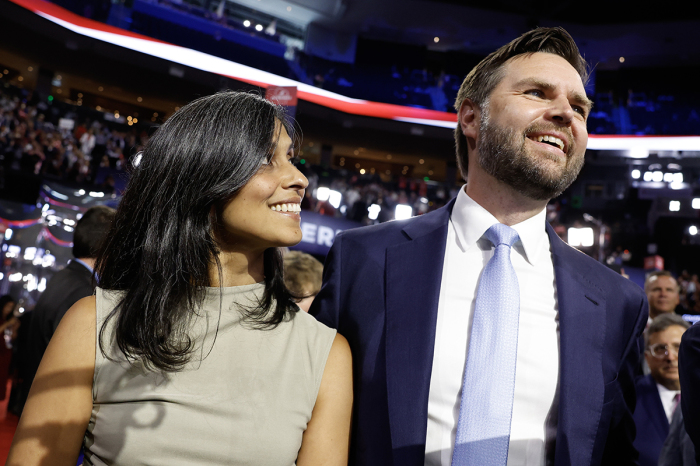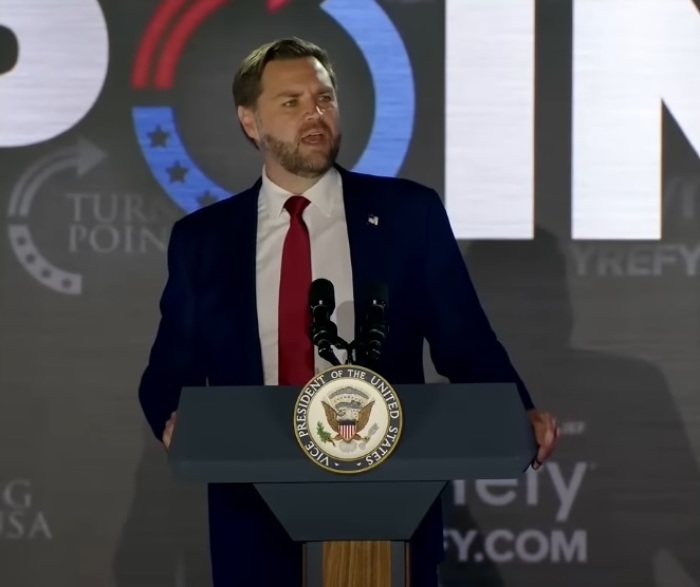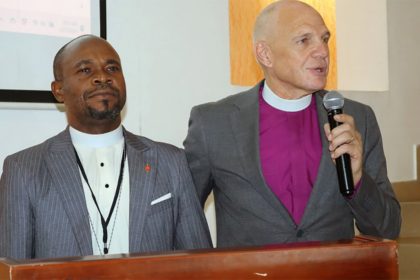
Vice President JD Vance says he’s raising his children in the Christian faith, despite being part of a mixed-faith family.
The 41-year-old clashed with a student over immigration policy and religious identity during a Turning Point USA event at the University of Mississippi on Wednesday, where he paid tribute to conservative activist Charlie Kirk.
Speaking alongside widow Erika Kirk, the new head of Turning Point USA, Vance addressed thousands in an arena, fielding questions in the mold of Kirk’s trademark “Prove Me Wrong” sessions. The Ole Miss stop was Erika Kirk’s only appearance on the tour, which has recently featured Megyn Kelly and Tucker Carlson at other campuses.
Kirk, Turning Point USA’s founder, was shot and killed in September at Utah Valley University.
Vance set a welcoming tone early by encouraging the audience to take time with their questions.
“Please don’t be nervous if you need to work through a question. Think through it, speak it,” Vance said. “We’re all here to have a nice conversation, and we’re all supportive of it.”
The crowd later chanted “48” in reference to a possible 2028 presidential bid.
“Let’s not get ahead of ourselves, ladies and gentlemen,” Vance replied.

The questions touched on a range of topics, including President Donald Trump’s Israel policy and donor Miriam Adelson, mandating Christianity in schools, and bridging divides with Democrats — where Vance noted agreement on antitrust issues.
Perhaps the event’s most heated moment came when a student who identified herself as a non-Christian confronted Vance on what she called a betrayed “dream” for legal immigrants who invested their lives and money only to face restrictive policies. She also challenged the role of Christianity when it comes to expressing one’s love for America.
“I’m not even Christian and I’m here standing to support,” she said. “Why are we making Christianity one of the major things that you have to have in common?”
Vance pushed back on the student’s framing of the immigration issue, which the VP said was more about honoring legal pathways but rejecting unlimited future inflows.
“I can believe that we should have lower immigration levels. But if the United States passed a law and made a promise to somebody, the United States, of course, has to honor that promise,” he said. “I’m talking about people who came in in violation of the laws. … And my job as vice president is not to look out for the interest of the whole world. It’s to look out for the people of the United States.”
After his response drew thunderous applause, Vance argued that past immigration policy doesn’t necessarily inform what future changes may look like.
“Just because one person or 10 people or 100 people came in legally … does that mean that we’re thereby committed to let in a million or 10 million or 100 million people a year in the future?” he asked. “No.”
Referring back to the student’s question about his interfaith household, Vance said his wife, Usha, who was born in California to Telugu Indian immigrant parents, “did not grow up Christian.”
“I think it’s fair to say that she grew up in a Hindu family, but not a particularly religious family in either direction,” Vance added. “In fact, when I met my wife, we were both, I would have considered myself an agnostic or an atheist, and that’s what I think she would have considered herself as well.”
Vance shared how he and the second lady have decided to make the Christian faith the foundation of their kids’ upbringing.
“We’ve decided to raise our kids Christian,” he explained. “Our two oldest kids who go to school, they go to a Christian school. Our 8-year-old did his first communion about a year ago. That’s the way that we have come to our arrangement.”
While acknowledging that navigating a mixed-faith marriage requires commitment, communication and grace, Vance said his marriage is no different than that of his friends who are in Protestant and Catholic marriages or even, as he put it, “atheist and Christian marriages,” saying it requires communication.
“The only advice I can give is, you just got to talk to the person that God has put you with and you’ve got to make those decisions as a family unit,” he said, adding that on most Sundays, Usha will join him and the rest of the family at church — even if she’s not yet a Christian.
“Do I hope eventually that she is somehow moved by the same thing that I was moved by in church? Yeah, I honestly do wish that, because I believe in the Christian Gospel and I hope eventually my wife comes to see it the same way,” said Vance. “But if she doesn’t, then God says everybody has free will and so that doesn’t cause a problem for me.”
It’s not the first time Vance has publicly spoken about his faith. During the 2024 campaign, then-Sen. Vance shared how he went from being an atheist law student to a devout Christian.
Vance, who penned the 2016 bestselling memoir Hillbilly Elegy: A Memoir of a Family and Culture in Crisis, was primarily raised by his grandmother, who, while being a devout Christian who regularly prayed and read the Bible, attended church services once or twice a month.







